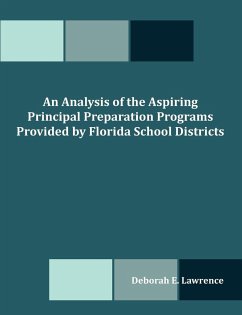The purpose of the study was to identify the basis of the aspiring principal preparation program (APPP) components Florida school districts provide to their aspiring principals and their relationship, if any, to the state and ISLLC Standards. A total of 50 school districts in Florida participated in this study. The research was guided by the following questions: To what extent do the Florida school districts provide a formal APPP to their current assistant principals? (b) Upon what are the formal APPPs for current assistant principals based: the Florida Principal Competencies (FPCs), the Interstate School Leaders Licensure Consortium (ISLLC) Standards, or another source? (c) To what extent do the school district APPPs in the 67 Florida districts have component requirements that include professional development, mentoring, and a performance-based experience? and (d) Are there differences among the APPP components provided by Florida school districts of various sizes? The findings of the study were found through an examination of quantitative and qualitative data that were collected from the Florida Aspiring Principal Program Assessment (FLAPPA) survey and the school districts' APPP brochures located on their websites. This study supported the following conclusions: (a) 75% of the school districts in Florida do provide an APPP for their aspiring principals, (b) the FPCs and the ISLLC Standards are a part of the bases of the components found in APPPs provided by Florida school districts, (c) Florida school districts do provide APPPs that include components of a mentor principal, a performance-based experience, and professional development, (d) very large-sized school districts with a population over 100 thousand students contained the largest percentage of standards-based components in the APPP; small-sized school districts with a population of under 7 thousand students contained the least percentage of standards-based components in the APPP, (e) school districts in Florida recognized the need to modify and were in the process of modifying their APPPs according to the new Florida leadership standards, especially the component of technology, and (f) a lack of funding, time, and assessment were identified as APPP weaknesses and components in need of improvement. Recommendations of this study included: (a) further research on Florida school districts redesign of their APPP components to identify whether or not the components are based upon the new Florida Leadership Standards, especially technology; and the ISLLC educational standards; and (b) further research on Florida school districts providing a mentor principal and support team; professional development, and a performance-based experience to their current assistant principals who participate in an APPP, thus ensuring best practices in the APPP and improving the quality of their future principals.
Hinweis: Dieser Artikel kann nur an eine deutsche Lieferadresse ausgeliefert werden.
Hinweis: Dieser Artikel kann nur an eine deutsche Lieferadresse ausgeliefert werden.








